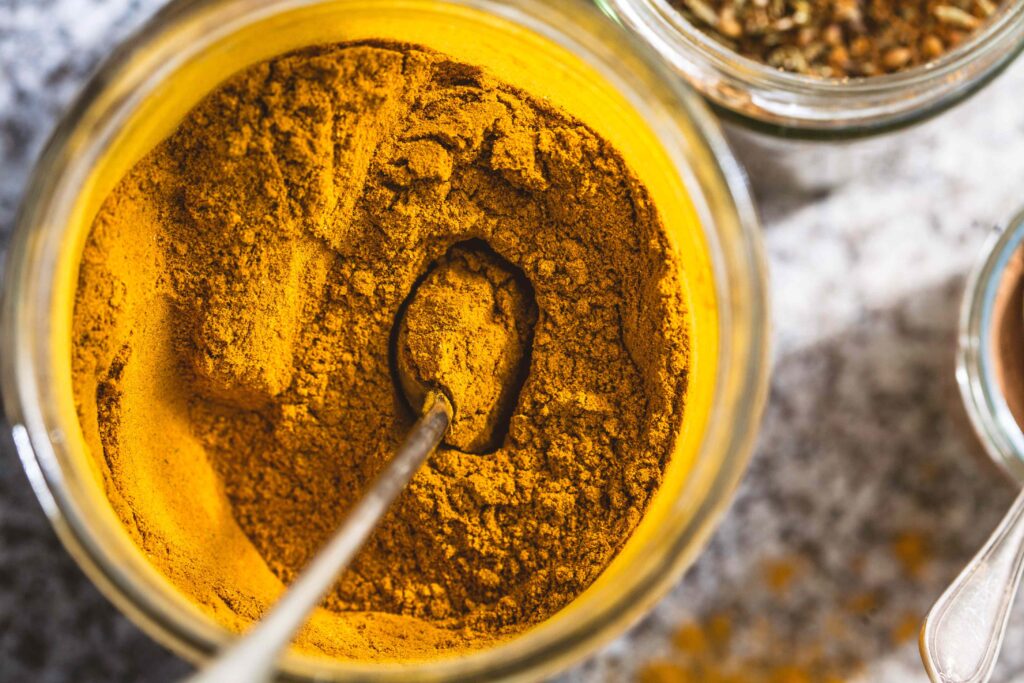Turmeric (Curcuma longa) is a popular spice known for its intense yellow color. Studies suggest that curcumin, the active ingredient in turmeric, can help with weight loss due to its antioxidant and anti-inflammatory effects. However, this may depend on how well your body absorbs turmeric, among other factors.
Turmeric supplements—particularly those that have been enhanced to increase bioavailability (improved absorption by the body)—may help you lose weight. Turmeric is most effective for weight loss when paired with lifestyle modifications,
One study found that people who used turmeric for weight loss had a 2-10% reduction in body fat, waist circumference, hip circumference, and body mass index (BMI).
Turmeric’s ability to promote weight loss may be due to the spice’s primary compound, curcumin, which has antioxidant and anti-inflammatory properties.
Although more research is needed to confirm these effects, turmeric may help you lose weight and reduce your waistline because it:
- Boosts metabolism through increased calorie-burning activities in brown and white fat
- Reduces inflammation, which has been associated with obesity
- Reduces adipogenesis (the production of new fat cells)
- Regulates hormones like leptin and adiponectin that influence hunger, metabolism, and weight
- Helps the body use more energy instead of storing it as fat
- Acts as a gentle prebiotic that helps regulate gut health
There are several ways to add turmeric to your daily routine to get its weight loss benefits. You can cook with the dried spice, juice the fresh root, or take it as a supplement.
Food and Drink
You can add turmeric as a cooking spice or make it into turmeric shots or golden milk lattes. However, while these options might taste good, your body does not absorb curcumin well from food.
Also, there’s not much curcumin in a teaspoon of turmeric powder. Studies suggest that turmeric contains about 3-8% curcumin. A dessert spoon of turmeric powder, which is about 3 grams, only contains about 30-90 milligrams of curcumin.
Research suggests higher amounts of curcumin (500-2,000 milligrams) are needed for weight loss. So, adding turmeric to your food or drink may not be an effective way to enjoy its weight loss benefits.
However, if you still prefer raw turmeric over supplements, you can increase its bioavailability to reap more benefits. Pairing turmeric with black pepper (piperine) or an oil or fat-rich food, such as coconut oil or avocados, can increase the amount of curcumin your body absorbs.
Supplements
Consuming higher doses of curcumin than found in foods is a more effective way to use turmeric for weight loss. Many available turmeric supplements contain up to 95% curcumin.
There’s currently no recommended dose of turmeric for weight loss. However, most research found that curcumin supplements used at doses between 500 and 2,000 milligrams daily could support weight loss.
You can purchase turmeric supplements in various forms, including capsules, powders, gummies, and tinctures. However, it is best to look for brands containing piperine, nanoparticles, antioxidants, or phospholipids. These ingredients help the body better absorb the supplement.
For safety, always ensure any curcumin supplement you purchase has been independently tested by third-party organizations (such as ConsumerLab, USP, or NSF) for authenticity and presence of toxic metals.
Turmeric is generally considered safe in doses of up to 8,000 milligrams per day. However, if you consume high doses of turmeric, you may experience common side effects such as:
- Nausea
- Vomiting
- Headache
- Stomach upset
- Acid reflux
- Yellow stool
Some studies have linked turmeric consumption to liver failure, but this is rare. Still, if you notice any symptoms of liver damage, such as dark urine, jaundice, fatigue, nausea, or poor appetite, stop taking the turmeric products immediately and talk with your healthcare provider.
Currently, there isn’t enough research on turmeric during pregnancy to recommend its use. If you are pregnant or breastfeeding, talk to your doctor before using turmeric.
The use of turmeric is also not recommended for people with gallstones or blocked bile ducts.
Drug Interactions
Turmeric can affect the way some medications work. Let your doctor know if you use the following medications before using turmeric:
- Blood thinners or anticoagulants such as aspirin (acetylsalicylic acid), Plavix (clopidogrel), and Coumadin (warfarin)
- Antacids such as Tagamet (cimetidine), Pepcid (famotidine), and Zantac (ranitidine)
- Blood sugar medications such as Glucophage (metformin) and insulin
- Cancer medicines such as tamoxifen
- Hormone replacement therapy, such as estrogen pills
- Blood pressure-lowering medications such as amylodipine
Turmeric may support weight loss when combined with lifestyle changes like diet and exercise. However, adding turmeric to meals alone might not be enough to see results.
Turmeric supplements, taken in doses of 500-2,000 milligrams daily, may be more effective for weight loss than turmeric used in food. However, taking more than 8,000 milligrams of turmeric per day increases the risk of side effects such as nausea, vomiting, stomach pain, and acid reflux.


